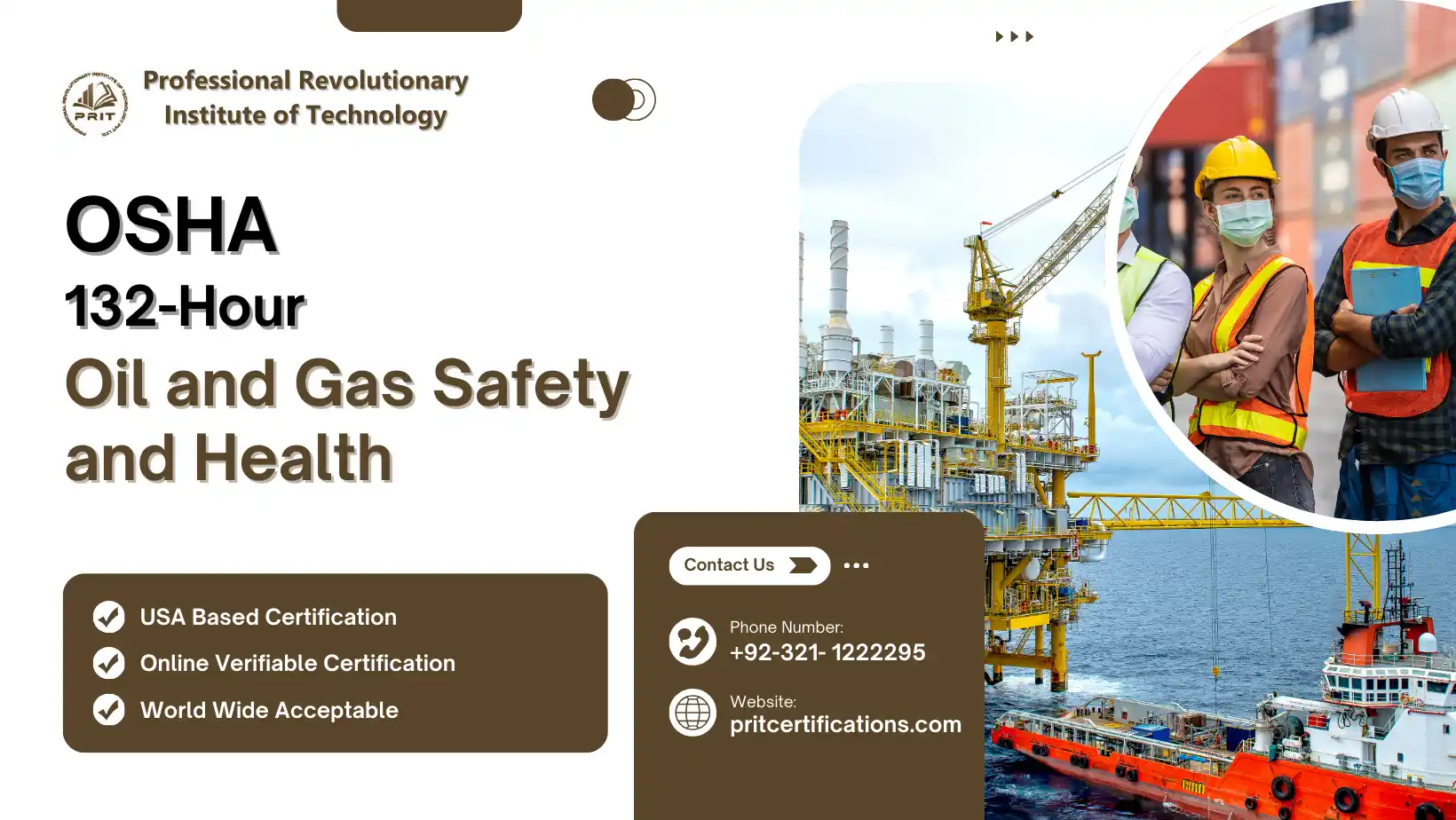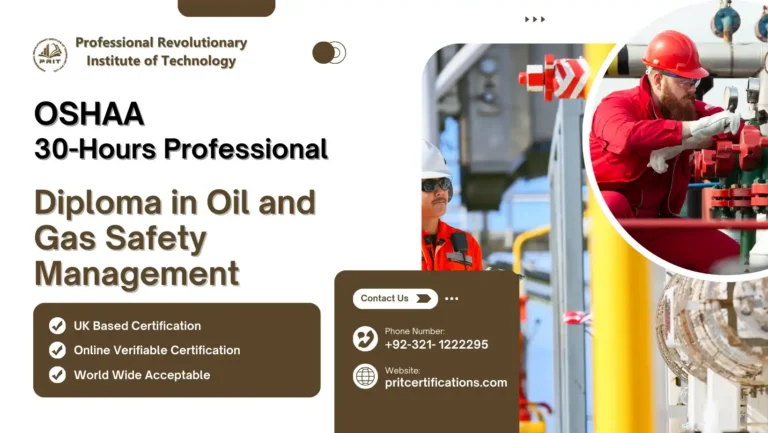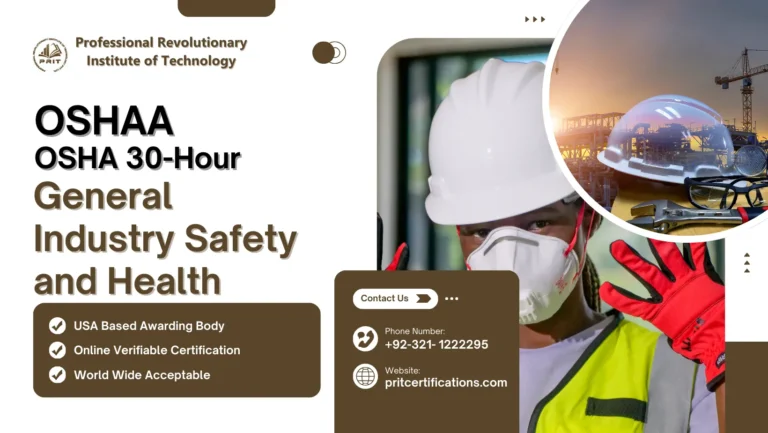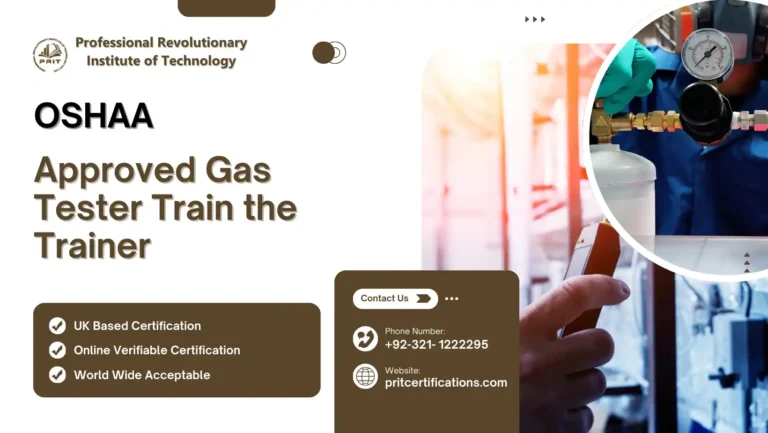
The OSHA 132-Hour Oil and Gas Safety and Health course is a comprehensive program designed for professionals working in one of the world’s most high-risk industries. The oil and gas sector presents unique safety challenges due to hazardous environments, high-pressure operations, flammable substances, and complex equipment. This course equips participants with advanced knowledge of OSHA regulations, risk assessment techniques, safety culture development, and emergency preparedness strategies tailored for oil and gas operations.
Learners will explore topics such as Process Safety Management (PSM), health and environmental hazards, contractor safety management, and auditing for regulatory compliance. Emphasis is placed on building a proactive safety culture, improving hazard control systems, and ensuring workforce protection through advanced training and the use of personal protective equipment (PPE).
By completing this program, participants will acquire globally relevant skills to identify risks, implement preventive measures, and lead safety initiatives that reduce workplace incidents. Whether you are a safety officer, supervisor, manager, or engineer, this course will empower you to enhance safety performance in oil and gas operations while aligning with international standards.
Course Overview
Qualification Title: OSHA 132-Hour Oil and Gas Safety and Health
Regulated by: OSHA
Guided Learning Hours (GLH): 132 hours
Credits: 30
Level: International Professional Certification
Mandatory Study Units
- Understand Advanced OSHA Regulations and Standards
- Advanced Hazard Identification and Risk Assessment
- Process Safety Management (PSM)
- Emergency Preparedness and Response Planning
- Health and Environmental Hazards
- Leadership and Safety Culture
- Advanced Personal Protective Equipment (PPE)
- Safety Training and Education
- Contractor and Vendor Safety Management
- Regulatory Compliance and Auditing
Learning Outcomes
By the end of this course, learners will be able to:
- Understand Advanced OSHA Regulations and Standards
- Interpret OSHA regulations applicable to the oil and gas industry.
- Apply advanced compliance requirements to daily operations.
- Ensure safe work practices in line with international standards.
- Advanced Hazard Identification and Risk Assessment
- Identify, evaluate, and prioritize workplace hazards.
- Conduct advanced risk assessments to prevent incidents.
- Recommend practical control measures for hazard mitigation.
- Process Safety Management (PSM)
- Implement PSM frameworks for hazardous processes.
- Audit and evaluate safety-critical operations.
- Reduce the risk of catastrophic events in oil and gas plants.
- Emergency Preparedness and Response Planning
- Design effective emergency response plans for oil and gas operations.
- Coordinate evacuation, containment, and rescue procedures.
- Train teams for quick response during critical incidents.
- Health and Environmental Hazards
- Recognize occupational health risks such as noise, chemicals, and ergonomics.
- Manage environmental hazards including spills and emissions.
- Apply preventive measures for long-term workforce health.
- Leadership and Safety Culture
- Develop leadership skills to promote a positive safety culture.
- Encourage worker engagement and reporting of unsafe conditions.
- Drive organizational change towards proactive safety management.
- Advanced Personal Protective Equipment (PPE)
- Evaluate and implement specialized PPE for high-risk environments.
- Train workers on PPE usage, limitations, and maintenance.
- Integrate PPE into workplace safety systems.
- Safety Training and Education
- Design and deliver effective safety training programs.
- Apply adult learning principles to maximize workforce engagement.
- Continuously assess training effectiveness and impact.
- Contractor and Vendor Safety Management
- Evaluate contractor compliance with safety requirements.
- Develop systems for monitoring vendor performance.
- Integrate contractor management into overall safety plans.
- Regulatory Compliance and Auditing
- Conduct safety audits to ensure compliance with OSHA and international standards.
- Document and report safety performance.
- Recommend corrective and preventive actions for continuous improvement.
Entry Requirements
- A Level 3 or 4 qualification in occupational safety, engineering, or related field, or equivalent professional experience.
- Proficiency in English (reading, writing, and communication).
- Basic knowledge of health and safety principles.
- Prior work experience in oil and gas or heavy industry is an advantage but not mandatory.
Course Benefits
- Gain an internationally recognized OSHA-based safety certification.
- Acquire advanced skills to manage safety, health, and environmental risks.
- Enhance employability in the oil and gas sector worldwide.
- Learn from industry-driven modules with practical applications.
- Contribute to organizational safety culture and incident reduction.
- Strengthen your career profile as a competent safety professional.
Why Choose This Course
- Delivered under OSHA’s globally respected framework.
- Combines theory, case studies, and practical applications.
- Meets international standards for oil and gas safety training.
- Prepares learners for senior-level safety management roles.
- Recognized across multiple sectors including oil, gas, and petrochemicals.
Who Can Enroll in This Course?
This course is ideal for:
- Safety officers and managers.
- Engineers, supervisors, and project managers.
- Health and environmental professionals.
- Contractors and site inspectors.
- Professionals aspiring to work in oil and gas safety.
- Graduates seeking entry into the oil and gas sector.
Future Progression
After completing this course, learners can progress to:
- Advanced OSHA certifications in specialized fields.
- Lead auditor qualifications in safety and environmental management.
- Senior positions such as Safety Manager, HSE Consultant, or Safety Director.
- International career opportunities in oil, gas, petrochemical, and energy sectors.
- Professional memberships in recognized safety organizations.






